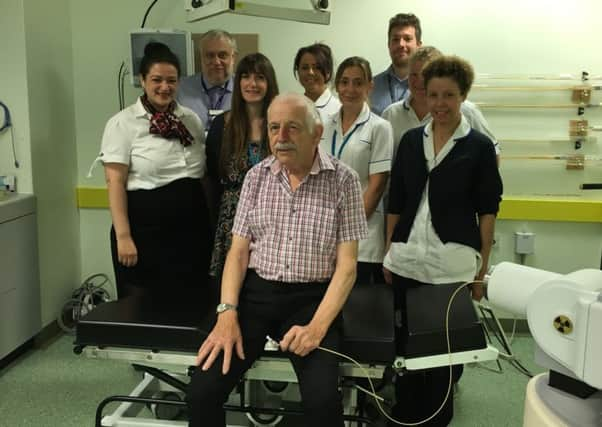Skin cancer treatment in Lincolnshire is UK first


Patients with non-melanoma skin cancer in Lincolnshire are benefitting from this new technique which is not only quicker and protects healthy tissue but is a first in the UK.
Peter Walmsley, 75, from Fishtoft, has just finished his course of brachytherapy treatment. He said: “I didn’t feel any pain or sensation during the sessions but I have had a slight tickle on my nose.
Advertisement
Hide AdAdvertisement
Hide Ad“The staff have been absolutely marvellous and really looked after me. I feel absolutely fine and I’m really pleased with how quick each session has been – less than ten minutes.
“I didn’t mind having to travel to Lincoln for the treatment because it was so quick and I wasn’t having to come in every day.”
Non-melanoma skin cancer is one of the most common types of cancer in the world. There are more than 100,000 new cases every year in the UK and it affects slightly more men than women.
Brachytherapy is delivered in a series of treatments and for most people they will receive five to eight sessions. Treatment can be completed in a relatively short space of time, usually over the course of two to four weeks.
Advertisement
Hide AdAdvertisement
Hide AdTreatment is given on an outpatient basis at Lincoln County Hospital for patients from across Lincolnshire, meaning the patient will not need to stay overnight in hospital. Each treatment delivery usually lasts only a couple of minutes per session.
United Lincolnshire Hospitals NHS Trust is the first trust in the UK to use this type of treatment and Consultant Morfo Georgiou said: “Brachytherapy delivers the radiation with a high degree of precision. The tumour gets a high dose of radiation and because of such accurate positioning we can exactly determine the depth of radiation required to minimise any damage to healthy surrounding tissues.
“The treatment is great for patients because it leaves no scarring and it requires fewer sessions than other treatment options.”